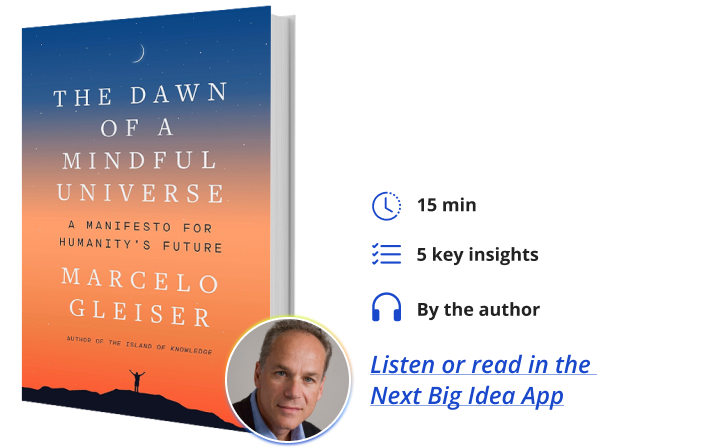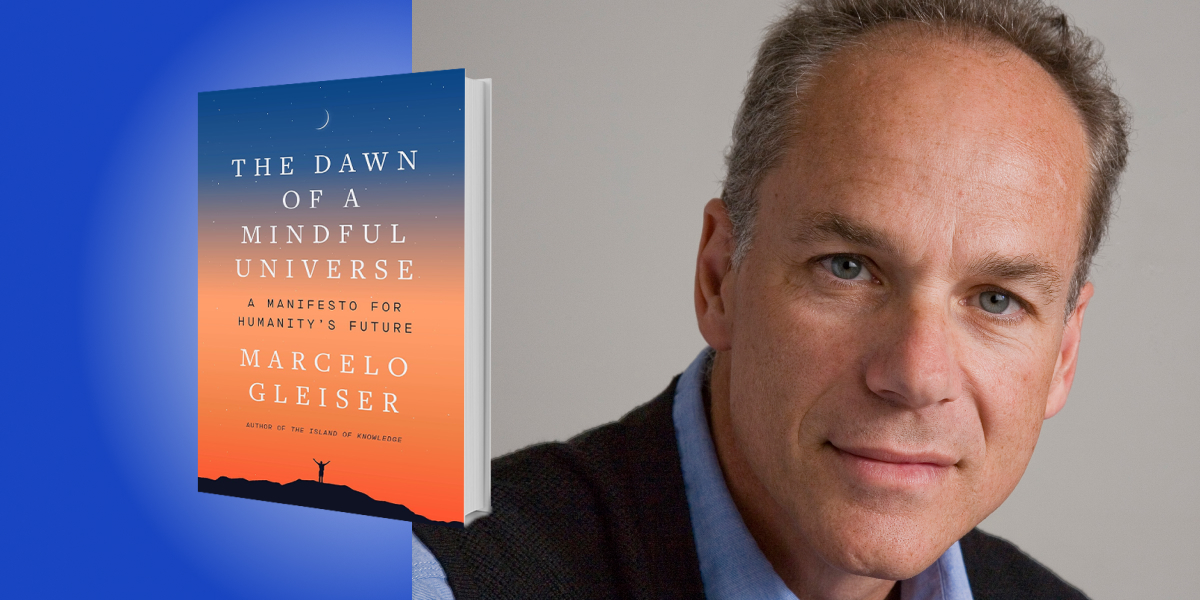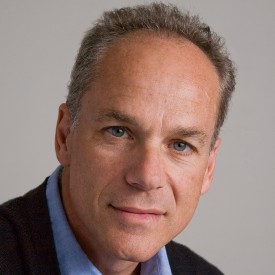Marcelo Gleiser is a theoretical physicist and a professor of natural philosophy, physics, and astronomy at Dartmouth College. He is the first Latin American winner of the Templeton Prize. He is a Fellow of the American Physical Society, and a recipient of the Presidential Faculty Fellows Award from the White House and National Science Foundation.
Below, Marcelo shares five key insights from his new book, The Dawn of a Mindful Universe: A Manifesto for Humanity’s Future. Listen to the audio version—read by Marcelo himself—in the Next Big Idea App.

1. We are not above Nature. We belong to Nature.
I use the word “manifesto” in the title on purpose: a manifesto is an urgent message, a call for action, a strategy to bring about change and transformation. We do need a revolution. Not one fought with weapons for a political cause, but one fought with a new mindset, one that protects our collective future under the banner of “biocentrism.” Biocentrism is the principle that a planet hosting life is sacred and that we, humans, must rise to the moral task of preserving our world and all life on it. We need to rethink who we are—and the “we” here means all humans. We must embrace a new way of relating to each other and to all living creatures if we are to save our project of civilization and our home planet. This is no naïve dream, but a must for our future.
Over the past 10,000 years or so, we used our incredible ability to invent new things, to transform raw stuff, like metal and stone, into tools. We then used those tools to plant, build, and fight. We humans grew in number and spread across the globe, feeding on any natural resources we could find—initially wood, water, coal, and later oil and natural gas. We used these resources to tame forests and fields into giant plantations, to congregate in ever-larger numbers in cities, to heal diseases, and to increase our lifespan. Technology changed the world and it changed us, and this change is still accelerating today.
“Biocentrism is the principle that a planet hosting life is sacred and that we, humans, must rise to the moral task of preserving our world and all life on it.”
All this progress gave us the false belief that we can control Nature, that we can tame it like we tamed wolves into dogs. We believe that humans are above Nature, that we are more like gods than like animals.
But this over-confidence is a serious mistake. We are very much part of Nature, dependent on it in deep ways, and much more fragile than we may want to accept. Just look at the deadly history of global pandemics and natural disasters to feel a bit humbler about our so-called power to control Nature. A sick planet cannot support healthy creatures. If the air we breathe, the water we drink, and the food we eat are tainted, we will not survive. We are part of the life collective, interconnected with all forms of life. Science and technology can and should help us, but they cannot save us from ourselves. We need a new way of relating to the world and to each other, and this new way calls for more than just technological outputs. It calls for a new human.
2. We all belong to a single tribe, the human tribe.
But where is this “new human” going to come from? Since everything that matters to us comes from stories that we tell each other, this new human must come from a new story of who we are. Amazingly, this story connects us not only to our planet and to all living creatures on it but to the whole Universe. We are, quite literally, creatures of the cosmos.
But first, we must rethink our tribal roots, we must understand that despite our political and religious differences, we are a single species living on a fragile and rare planet. We humans need to belong to groups, and these groups often define our values and drive our actions. This is how it’s always been, and it’s all good. Belonging gives us a sense of dignity and purpose.
The problem starts when a group, or a tribe, closes its doors to those who are different. A tribe protects but it also attacks and jostles for power. We may belong to different tribes, from our families and communities to our sports teams and churches, but we are, first and foremost, the human tribe, living on planet Earth. The new human narrative breaks down the tribal walls that separate us; it makes a convincing case that we need to work together if we are to protect our way of life and the planet that harbors it.
“A tribe protects but it also attacks and jostles for power.”
Moving beyond our instinctive tribalism is not easy. It requires humility and an openness to those who think, look, and act differently than we do. Being open to the “other” can only enrich our experience of being alive, as we learn and grow not by conflict but by humble curiosity. Since we live on a single planet, we are all dependent on each other for our collective survival.
We must go into a global hive-thinking mode. Everything begins with the understanding that life is a rare phenomenon in the Universe and must be protected collectively.
3. Life is an anomaly in the Universe, not the rule.
Starting with ancient beliefs about life in other worlds, we explore the nature and origin of life on Earth. We also expand our search for life in other worlds, in the field of Astrobiology, a new and fast-growing scientific field of research. Essentially though, we don’t know how life on Earth emerged over 3.5 billion years ago, or if it exists elsewhere and in what form. But we do know that as stars live and die, they spread their atoms across space, becoming new stars and planets and, in our solar system, becoming living creatures on planet Earth. We truly are made of stardust. We and all living creatures are the interconnectedness of the nonliving with the living.
What we are finding out is that life is a true anomaly in the Universe; the exception and not the rule. Look at our neighboring planets in the solar system, all magnificent and amazing worlds, each different, but all barren, dead worlds. The chances of finding life in any of the planets and moons of our solar system are very, very small. Even if there is life elsewhere, it will probably be very simple, amoeba-like. If there are other creatures out there capable of inventing tools as we can—and we don’t know one way or the other—we haven’t seen them or found any convincing traces of their existence. We should continue looking, but we also must come to terms with our cosmic loneliness, a loneliness that has deep moral consequences.
4. The Universe only has a history because we are here to tell it.
The fact that we know that life is rare in the Universe, and intelligent life even more so, makes us different. We are matter capable of telling stories. We are the cosmic storytellers, the ones that give the Universe a narrative and meaning. If there are other voices out there, they will tell a different story, not ours.
“We are matter capable of telling stories.”
Life on Earth is unique: if there is life elsewhere, it will be different. We can state with confidence that we are the only humans in the cosmos. Without our voice, the Universe would unfold into meaningless forms created and destroyed through the ages: dead, silent, aimless. We humans know time, space, love, life, death. We celebrate existence and are terrified by it. We build homes and weapons and spaceships; we build monuments to invisible gods and write poems about ineffable feelings. We look at the stars in search of our origins. We have a mysterious capacity for awe and wonder. We humans are the ones with the power to either destroy or protect our living planet and its biosphere. The time has arrived to choose which path to take. We must choose with urgency and care. Without our voice, the Universe would fall silent.
5. Biocentrism: Any living world is sacred.
Since every tribe is united by a set of principles, what is the unifying principle of the human tribe? I call it biocentrism, the principle that any planet that hosts life is sacred.
The acceptance of our cosmic loneliness and the rarity of our planet is a wake-up call, ringing to awaken a new collective consciousness. I believe it to be the new unifying myth of our generation, with the power to go beyond tribal divides and bigotry, to lead us into a new era of human flourishing. But for this to happen, we need to change how we relate to life and to the planet that allows us to exist.
We are not above Nature, and we don’t own it. We are a part of it and depend on it for our existence. Life is rare. We are rare. This planet is rare. Treasure life and the planet, worship it, and learn from Indigenous cultures and their sacred connection to the land. Let’s re-sacralize our planet. This is the moral imperative of our age. We owe this to future generations and to the life we share this planet with. We can each take steps to become catalysts of this upcoming transformation of the human story.
To listen to the audio version read by author Marcelo Gleiser, download the Next Big Idea App today:































